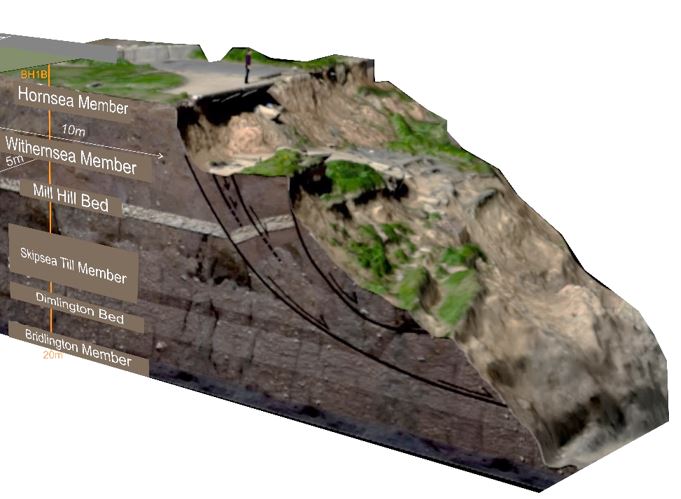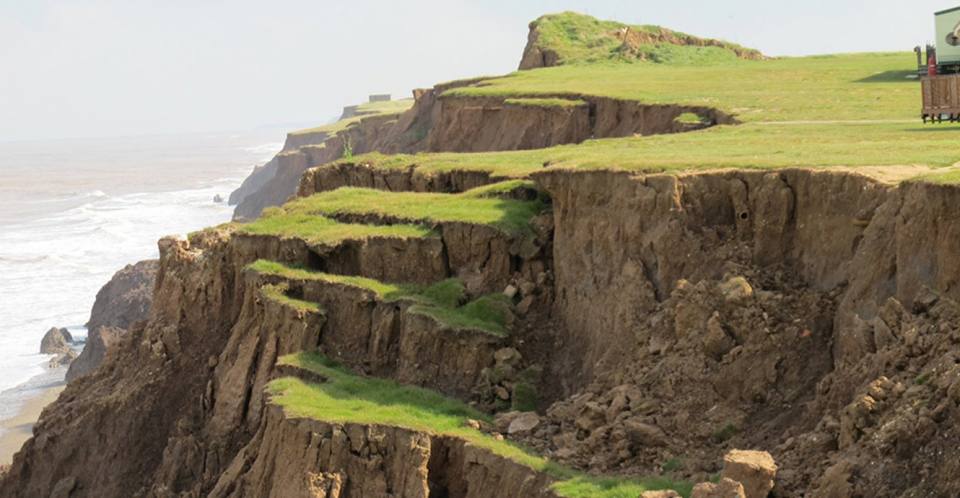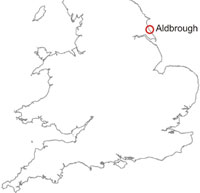The Aldborough Coastal Landslide Observatory site is 1.5 km north-east of Aldbrough itself, which is approximately 18 km north-east of Hull. It was selected because it is on one of the fastest-eroding coastlines in Europe, at a rate of 2 m per year overall.
The steep cliffs face north-east and have a regular height of about 20 m. They are actively receding and the cliff profile is stepped due to the contrasting erosion resistances of the tills and the different landslide processes in the upper and lower parts of the cliff.
At high tides, the lower and, in some cases, middle sections of the cliff are subject to considerable erosion by wave action. Several buildings have been lost to the sea since 1885 including the Spa Inn, the Talbot Hotel and the Royal Hotel.
Surveying activity
We have been monitoring and modelling landslide activity at Aldbrough since 2001. A range of surveying and monitoring techniques have been used to build our first coastal landslide observatory:
- geophysics (PRIME)
- inclinometers
- piezometers
- terrestrial LiDAR scanning
- UAV photogrammetry
- wave buoy data
- weather station
We have captured cycles of major, deep-seated landslide activity. Preliminary results confirm the relationships between landslide activity and volume loss with environmental factors such as rainfall and wave action. Landslide behaviour has also been examined.
Boreholes
Three pairs of boreholes were sited back from the cliff edge by 10 m, 20 m and 28 m (at time of installation); one of each pair contained an inclinometer casing and the other a piezometer array. The boreholes were drilled to 20 m depth and aligned perpendicular to the cliff.
Geophysical instrumentation, consisting of a new generation of PRIME, our automated electrical resistivity tomography (ERT) system, was added in 2015 and 2018 in the form of one downhole and two surface arrays, arranged orthogonally to the boreholes.
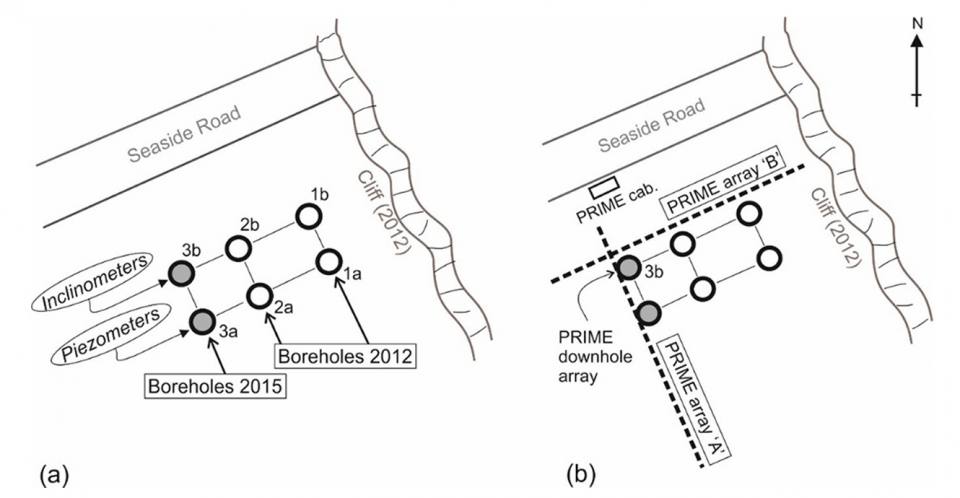
Further reading
Hot off the press! Results from our Coastal Landslide Observatory by Catherine Pennington
On a windswept, wave-battered cliff on the coastline of the East Riding of Yorkshire stands an unassuming landslide that has no idea just how important it is. This landslide is being watched. Every move it makes is being recorded and analysed by us here at the BGS.
, P R N,, L D, , M P, , S J, , C V L,, C, Establishment of a coastal landslide observatory at Aldbrough, East Riding of Yorkshire, UK.
, P R N,, L D, , M P, , C V L, Morgan, D J R, and Dashwood, C. 2019. Coastal landslide monitoring at Aldbrough, East Riding of Yorkshire, UK.
Hobbs, P R N, Jones, L D, and Kirkham, M P. 2015. Slope dynamics project report: Holderness Coast — Aldbrough, drilling and instrumentation 2012–2015. British Geological Survey Internal Report IR/15/001. (Nottingham, UK: British Geological Survey.) (Unpublished.)
Hobbs, P R N, Kirkham, M P, and Morgan, D J R. 2015. Geotechnical laboratory testing of glacial deposits from Aldbrough, phase 2 boreholes. British Geological Survey Open Report OR/15/056. (Nottingham, UK: British Geological Survey.) (Unpublished.)
Hobbs, P R N, Jones, L D, Kirkham, M P, Morgan, D J R, Pennington, C .L, Jenkins, G O, Dashwood, C, Haslam, E P, Freeborough, K A, and Lawley, R S. 2013. Slope dynamics project report: Holderness Coast — Aldbrough, survey and monitoring 2001–2013. British Geological Survey Open Report OR/11/063. (Nottingham, UK: British Geological Survey.) (Unpublished.)
You may also be interested in
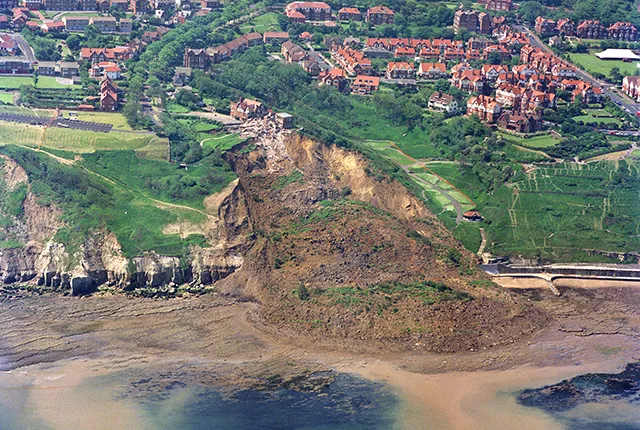
Landslides
Building resilience both in the UK and internationally to landslides and carrying out many aspects of landslide research.
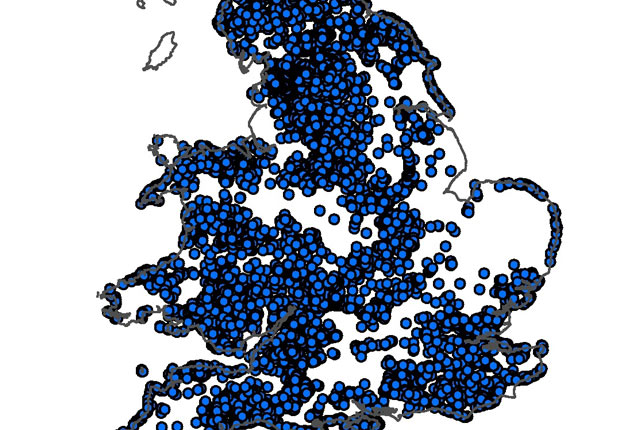
National Landslide Database
The BGS National Landslide Database (NLD) is the most extensive source of information on landslides in Great Britain.
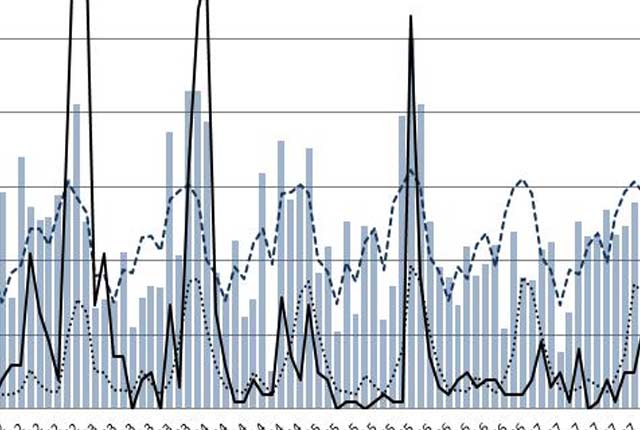
Landslides and rainfall
We combine rainfall statistics and landslide data to produce graphs demonstrating the relationship between landslides and rainfall.


